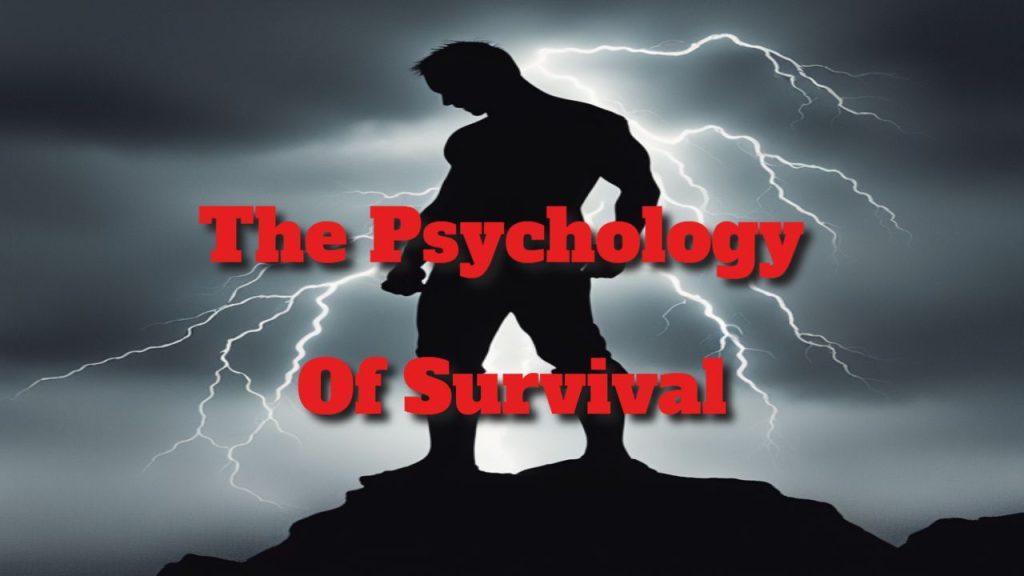Master Survival Psychology: Essential Strategies for Thriving Under Pressure
The saying “desperate times call for desperate measures” encapsulates the essence of survival, particularly when delving into the intricate layers of survival psychology. In the face of severe threats, the human mind experiences a remarkable transformation, awakening powerful reserves of strength and resilience that typically lie dormant in our daily lives. This transformation goes beyond simple reaction; it signifies a holistic activation of both mental and emotional resources, highlighting the astounding potential of our minds when confronted with adversity. Grasping these psychological shifts is paramount for anyone seeking to bolster their survival skills and enhance their mental toughness, making this understanding vital for personal and professional growth in high-stress environments.
When confronted with life-threatening dangers, a complex interplay of psychological mechanisms emerges. What occurs in our minds when every second is critical? How do we make pivotal decisions amid overwhelming stress? Furthermore, how does our innate psychological framework influence our ability to endure, adapt, and ultimately thrive in chaotic situations? These inquiries are central to understanding the dynamics of survival psychology, which we will explore in depth throughout this extensive article. By illuminating the foundational elements that empower us to persevere under pressure, we can gain valuable insights into our intrinsic capabilities and behavioral responses during crises. This knowledge not only fosters personal resilience but also enhances our ability to support others in distressing situations.
Join us on a profound journey into the fascinating realm of survival psychology, where we will dissect its complexities and uncover the essential components that dictate our capacity to overcome challenges and succeed in life-threatening circumstances. This exploration will equip you with actionable insights and strategies to harness your psychological strengths effectively.
Understanding How Fear Shapes Survival Responses and Decision-Making
Fear is a fundamental element of our survival instincts, acting as a primal response that prepares our bodies to act quickly in the face of potential threats. This intense emotion initiates a series of physiological reactions designed to enhance our chances of survival during perilous situations. As fear grips us, various physiological changes take place: our heart rate increases, breathing quickens, and muscles tense, creating a heightened state of alertness that primes us for immediate action. Grasping this physiological response is essential for anyone aiming to refine their survival instincts and reactions in critical moments.
This heightened state of readiness sharpens our reflexes and promotes swift decision-making, empowering us to effectively confront imminent dangers. Moreover, fear enhances our sensory perception, allowing us to better detect our environment and recognize potential threats that might otherwise go unnoticed. It compels us to focus intently on our surroundings, bolstering vigilance and helping us identify critical warning signs essential for survival. Without the presence of fear, our ability to navigate hazardous situations could be significantly impaired, underscoring its indispensable role in our survival toolkit. By understanding the interrelationship between fear and survival mechanisms, we deepen our appreciation for the complexities of human experience while arming ourselves with practical knowledge that can be applied in real-life scenarios.
Building Resilience: The Key to Overcoming Life’s Toughest Obstacles
In high-stakes situations, the ability to cultivate resilience becomes crucial for sustaining the will to survive. Resilience is defined as the capacity to recover from adversity, adapt to difficulties, and bounce back from setbacks, even when faced with significant challenges. This vital quality often distinguishes those who succumb to despair from those who summon the inner strength to continue their survival efforts. Actively cultivating resilience is a proactive measure anyone can undertake to enhance their overall life experience and capacity for coping with stress.
However, resilience does not imply a lack of fear or pain; rather, it embodies the steadfast determination to push forward despite emotional turmoil. It encompasses fostering a positive mindset, establishing realistic goals, and effectively utilizing available resources to navigate hardships. By building resilience, individuals empower themselves to face life’s challenges with confidence, equipped with the insights and strategies necessary for triumph. This transformative mindset is beneficial not only in survival scenarios but also enriches one’s broader life experience, instilling hope and enabling individuals to confront future obstacles with renewed vigor and resolve.
Enhancing Decision-Making Skills Under Pressure for Better Outcomes
The ability to make sound decisions can be severely compromised in high-stress environments. The inherent pressure and urgency typical of these critical moments can cloud our judgment, leading to hasty or ill-considered choices. During stressful incidents, the brain enters a heightened state of arousal, activating the fight-or-flight response, which can overwhelm rational thought processes and push individuals to rely more on instinct rather than reasoned analysis. Acknowledging these patterns is essential for developing effective decision-making strategies.
This physiological response can inhibit cognitive functions, making it challenging to process information and weigh the pros and cons of various options. To mitigate these effects, it is crucial to understand how stress impacts decision-making and actively employ strategies that reduce its influence. Techniques such as practicing deep breathing exercises, allowing brief moments for reflection, or seeking input from trusted individuals can significantly bolster one’s ability to make informed and effective decisions. By refining decision-making skills in high-pressure situations, individuals can greatly enhance their chances of successfully navigating through difficult and potentially life-threatening scenarios.
The Critical Importance of Social Support in Crisis Management
Recognizing the significance of social support is essential for effectively managing stressful situations. A solid network of friends, family, and colleagues provides invaluable assistance and resources, enabling individuals to cope and thrive during challenging times. The emotional encouragement, practical help, and sense of community offered by social connections are crucial for fostering resilience and improving overall well-being. In any crisis, the strength derived from social support can profoundly influence outcomes.
Research consistently demonstrates that individuals with strong social networks experience better mental health outcomes and recover more swiftly from traumatic events. Furthermore, having a support system enhances problem-solving skills, offers fresh perspectives, and delivers essential motivation and encouragement. Acknowledging the transformative power of social networks during crises can significantly alter one’s experience, allowing individuals to draw strength and insights from others when needed. Engaging with a supportive community not only aids in coping with immediate challenges but also contributes to long-term emotional resilience and recovery, reinforcing the concept that we are not alone in our struggles.
 Actionable Coping Strategies for Managing High-Stress Situations
Actionable Coping Strategies for Managing High-Stress Situations
What practical strategies can be implemented to successfully navigate life-threatening situations? Here are some effective tips:
– Maintain Composure and Focus: Take a moment to breathe deeply and assess your surroundings before taking action. This approach can help clarify your thoughts and sharpen your focus.
Prioritize Safety: Safeguard yourself and others by seeking shelter or distancing from imminent threats whenever possible. Your safety should always be the top priority.
– Stay Alert: Remain vigilant about your surroundings, paying close attention to potential dangers or changes in the environment that could affect your safety.
– Communicate Effectively: If necessary, signal for help or inform others about the danger you are facing. Clear communication can be essential in survival situations.
– Trust Your Instincts: Rely on your gut feelings and make prompt decisions based on the information available to you. Your instincts can provide invaluable guidance.
– Utilize Available Resources: Make the most of all available tools and resources to improve your chances of survival, whether they are physical tools or social support.
– Maintain a Positive Outlook: Foster a belief in your ability to overcome the situation. A positive mindset can significantly influence your resilience and responses.
Effective Coping Mechanisms for Trauma Survivors and Those with PTSD
For individuals with a history of trauma or PTSD, implementing effective coping strategies during life-threatening situations is essential for managing anxiety and fostering resilience. Tailoring these techniques can empower individuals to regain control over their responses and emotions.
– Practice Deep Breathing Techniques: Utilize grounding strategies to stabilize anxiety levels and promote a sense of calm. Deep breathing can help center your thoughts and alleviate panic.
– Seek Social Support: Reach out to friends, family, or mental health professionals for assistance. Connecting with others can provide essential support during challenging periods.
– Engage in Self-Care Activities: Prioritize actions that promote mental and physical well-being, aiding in recovery and resilience-building over time.
These coping strategies are vital for managing anxiety and nurturing resilience. It is important to recognize that resilience is not merely an inherent trait; it can be actively developed through consistent practice and support. With the appropriate strategies in place, anyone—regardless of their background—can enhance their ability to rebound from adverse situations.
Additionally, understanding how decision-making under stress influences long-term mental health and recovery from traumatic experiences is crucial. The choices made during high-pressure situations can significantly shape recovery trajectories and overall mental well-being following life-threatening events.
Identifying the psychological barriers people face when seeking social support during crises is equally important. Common challenges during these pivotal moments may include feelings of vulnerability, fear of judgment, trust issues, and difficulties expressing one’s needs. Recognizing these obstacles is essential since they can hinder the process of seeking help and exacerbate stress and anxiety.
To effectively navigate these hurdles and access the necessary support, consider taking manageable steps such as confiding in a trusted friend, consulting a mental health professional, or joining a supportive group. Remember, seeking help is a courageous act, and there are individuals who are ready and willing to assist you in your time of need.
Exploring the Fascinating Realm of Survival Psychology
The psychology of survival represents a rich and multifaceted field that provides profound insights into human behavior. While anxiety is a natural reaction to life-threatening situations, resilience is what empowers us to recover from adversity and continue moving forward. By understanding how stress affects decision-making, we can significantly improve our chances of survival. Additionally, recognizing the pivotal role of social support provides the essential strength and comfort needed during challenging times.
Utilizing effective coping strategies enables us to navigate complex and life-threatening situations more skillfully, ultimately leading to increased resilience and better mental health outcomes. This exploration of survival psychology not only deepens our understanding of our own capabilities but also equips us with the practical tools necessary to confront unforeseen challenges with confidence and determination.
Frequently Asked Questions About Survival Psychology
How do anxiety disorders affect survival psychology?
What psychological differences exist in survival responses between those with anxiety disorders and those without?
Individuals with anxiety disorders may display heightened reactions to fear and stress, while those without may employ more adaptive coping strategies, leading to varied survival outcomes.
What are the most effective coping strategies for trauma survivors or individuals with PTSD during survival situations?
The Article Survival Psychology: Understanding the Mindset Appeared First On Survival Avenue.
The post Survival Psychology: Mastering the Mindset appeared first on Survival Bite.
The Article Survival Psychology: Unlocking Your Mental Resilience Was Found On https://limitsofstrategy.com


This is such an intriguing topic! I’ve often thought about how our mental state can shape our response to high-pressure situations. Just recently, I read about some survival stories where individuals tapped into an almost primal instinct when faced with danger; their sheer will to survive kicked in, revealing strengths they didn’t know they had.
It really is fascinating how our mental state plays such a crucial role in those high-pressure moments. I think about stories like that of Aron Ralston, who was trapped under a boulder and made the harrowing decision to amputate his own arm to survive. It’s a stark reminder of how our minds can push us beyond our perceived limits when survival is at stake.
It really is fascinating how our mental state plays such a crucial role in those high-pressure moments. Aron Ralston’s story certainly highlights that primal instinct for survival, doesn’t it? It’s remarkable to think about how the mind can become a powerful tool—or a daunting adversary—when faced with life-or-death situations.
It’s intriguing how our mental resilience can define our survival instincts, and I came across some techniques that really delve into this concept—perfect for anyone interested in understanding the psychology behind those critical moments.
‘Mental Resilience Techniques for Survival Psychology Mastery’
https://mkpitstop.co.uk/mental-resilience-techniques-for-survival-psychology-mastery/.
Your exploration of survival psychology raises intriguing points about the latent potential within us during crises. I find it fascinating how this concept parallels the stress response theory, which posits that individuals often enter heightened states of awareness and capability when faced with adversity.
Your observation about survival psychology and its connection to stress response theory opens up a rich avenue of thought. It’s interesting to consider how our minds and bodies react when we’re pushed to our limits. There’s a fascinating interplay between fear and focus; during crises, the brain can shift into a mode where heightened awareness seems to activate a reservoir of resources we didn’t know we had.
You’ve touched on a really compelling aspect of survival psychology, especially how it intersects with stress response theory. It’s interesting to consider how the body and mind can shift into that heightened state of awareness. Personally, I find myself contemplating situations where this might be evident, such as during natural disasters or even in high-pressure environments like healthcare settings.
It’s fascinating to explore how our minds shift during high-stress situations. I’ve often thought about the psychological aspects of survival since reading about it in various contexts, from military training to wilderness survival courses. It’s incredible how certain experiences can break down our typical thought patterns and unleash unexpected reservoirs of strength.